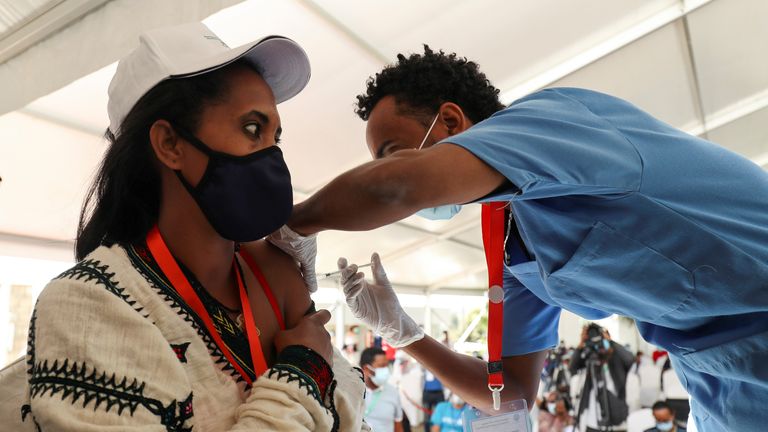There remains a "shocking imbalance" in the global distribution of coronavirus vaccines, the head of the World Health Organisation has said.
Tedros Adhanom Ghebreyesus said that on average, one in four people in rich countries have received at least one dose of a COVID-19 vaccine - compared with only one in 500 in low-income nations.
Mr Ghebreyesus spoke as it emerged that up to 60 countries, including some of the world's poorest, might be stalled in delivering the first shots of the coronavirus vaccination, as nearly all deliveries through the global program intended to help them are blocked until as late as June.
COVAX, the global initiative to provide vaccines to poorer nations, will only ship those cleared by the WHO, and countries are growing increasingly impatient as deliveries have all but halted since Monday.
Mr Ghebreyesus said: "There remains a shocking imbalance in the global distribution of vaccines."
Fewer than two million COVAX doses in total were cleared for shipment to 92 countries in the developing world during the past two weeks - the same amount injected in Britain alone, according to data compiled daily by UNICEF.
The vaccine shortage stems mostly from a decision by India to stop exporting vaccines from its Serum Institute factory.
The site produces the overwhelming majority of the AstraZeneca doses that COVAX counted on to supply around a third of the global population at a time coronavirus is spiking worldwide.
In vaccination tents set up at the Kenyatta National Hospital in Nairobi, many of those arriving for their first jabs are uneasy about when the second will arrive.
Oscar Odinga, a civil servant, said: "My fear if I don't get the second dose, my immune system is going to be weak, hence I might die."
Internal WHO documents obtained by the AP news agency show the uncertainty about deliveries "is causing some countries to lose faith in the COVAX (effort)".
That is reportedly prompting the organisation to consider speeding up its endorsement of vaccines from China and Russia, which have not been authorised by any regulators in Europe or North America.
WHO declined to respond specifically to the issues raised in the internal materials but has previously said countries are "very keen" to get vaccines as soon as possible and insisted it has not heard any complaints about the process.
Concern over the link between the AstraZeneca shot and rare blood clots has also "created nervousness both around its safety and efficacy", the WHO noted.
Among its proposed solutions is a decision to "expedite review of additional products" from China and Russia.
The WHO said in March that it might be possible to greenlight the Chinese vaccines by the end of April.
Subscribe to the Daily podcast on Apple Podcasts, Google Podcasts, Spotify, Spreaker
Some experts have noted that Sinopharm and Sinovac, two Chinese-made vaccines, lack published data, and there are reports of people needing a third dose to be protected.
Earlier this month, the WHO appealed to rich countries to urgently share 10 million doses to meet the UN target of starting COVID-19 vaccinations in every country within the first 100 days of the year.
https://news.google.com/__i/rss/rd/articles/CBMikQFodHRwczovL25ld3Muc2t5LmNvbS9zdG9yeS9jb3ZpZC0xOS13b3JsZC1oZWFsdGgtb3JnYW5pc2F0aW9uLWNoaWVmLWhpdHMtb3V0LWF0LXNob2NraW5nLWltYmFsYW5jZS1vZi12YWNjaW5lLWRvc2VzLWZvci1wb29yZXItY291bnRyaWVzLTEyMjcxMTMx0gGVAWh0dHBzOi8vbmV3cy5za3kuY29tL3N0b3J5L2FtcC9jb3ZpZC0xOS13b3JsZC1oZWFsdGgtb3JnYW5pc2F0aW9uLWNoaWVmLWhpdHMtb3V0LWF0LXNob2NraW5nLWltYmFsYW5jZS1vZi12YWNjaW5lLWRvc2VzLWZvci1wb29yZXItY291bnRyaWVzLTEyMjcxMTMx?oc=5
2021-04-10 10:14:16Z
52781500822505


Tidak ada komentar:
Posting Komentar